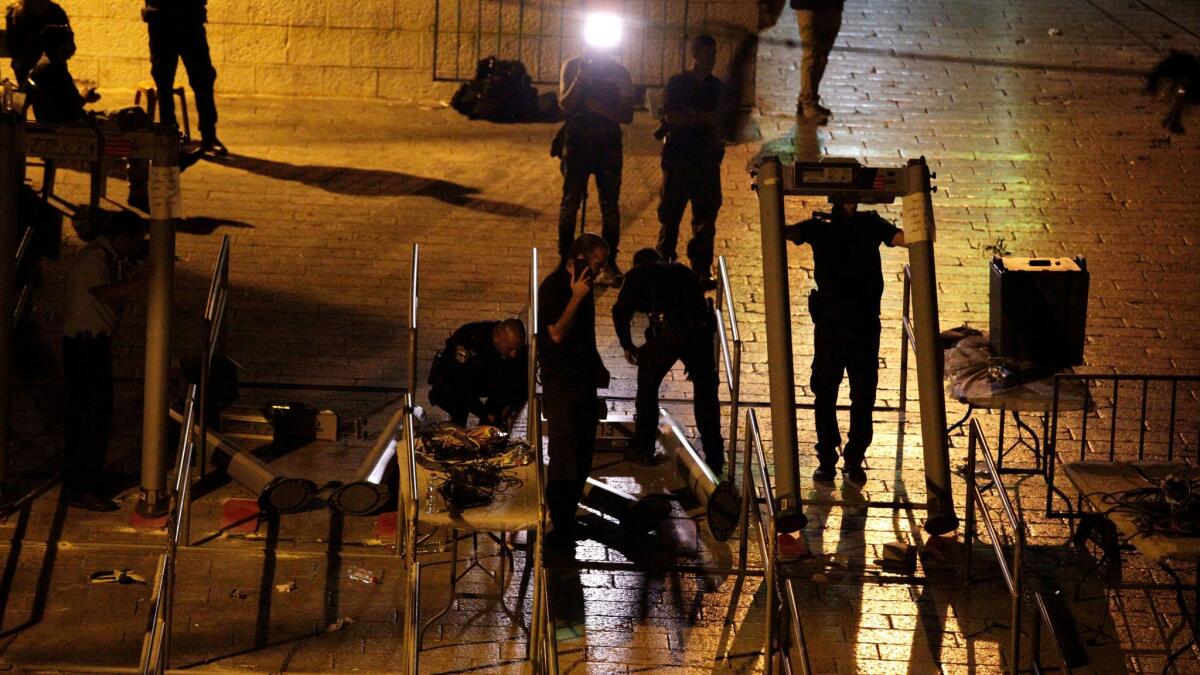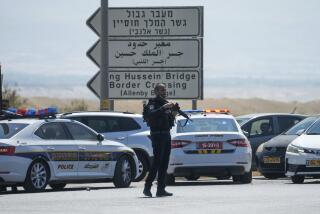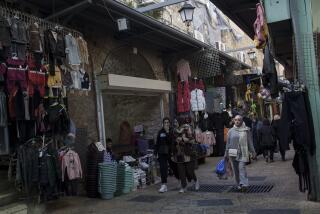With its Arab neighbors uncharacteristically quiet, Israel seeks to stem crisis

- Share via
Reporting from TEL AVIV — Seeking to defuse rising tensions with Muslims over access to a holy shrine in Jerusalem, the Israeli Cabinet announced early Tuesday that it would remove metal detectors it had placed at the entrance to the site after a deadly attack by Israeli Arab gunmen there this month.
Photographs posted on Twitter showed the metal detectors coming down shortly after the announcement.
They will be replaced with high-tech “smart inspection” equipment, the prime minister’s office said in a statement. Israeli media had reported that the government was considering high-resolution cameras that could detect hidden objects.
Until the new equipment is installed, the statement said, extra police will be deployed to the holy plaza, which is revered by Jews as the site of the Temple Mount and by Muslims as the Noble Sanctuary.
The metal detectors set off Muslim protests, which led to street battles in Jerusalem with Israeli security forces and stabbings of Israeli civilians. The violence, which left several dead on both sides and hundreds of Palestinians injured, prompted the Palestinian Authority to freeze ties with Israel.
The removal of the metal detectors comes amid growing cooperation between Israel and Jordan — the Muslim administrator of the shrine.
The improving relations have given the latest conflict a feel that is decidedly different from similar crises of the past, when Jordan and neighboring Arab countries recalled their ambassadors from Israel and sponsored anti-Israel resolutions in the Arab League and the United Nations.
This time, no heads of state spoke out as the clashes escalated, leaving any official criticism of Israel to bland statements by government ministries.
The shift reflects how Arab governments are more focused on other issues, including the civil war in Syria, the militant group Islamic State and an increasingly influential Iran. Israel, which is grappling with the same threats, is seen as an important, if quiet, partner.
“It’s not surprising that a country like Jordan, which has a large Palestinian population, wouldn’t want to fan the flame that they can’t control,” said Khaled Elgindy, a fellow at the Brookings Institution think tank in Washington. “The region is a mess. There are so many other crises happening. There’s more emphasis on the bilateral Egypt-Israel and Jordanian-Israel relations.”
For Jordan’s King Abdullah II, those national interests appear to have taken precedence over the need to appease a public that remains broadly sympathetic to the Palestinians and suspicious of Israel.
“Israel and Jordan have too much hanging in the balance” with Syria’s destabilization, said Eran Lerman, an Israeli former deputy national security advisor, in a conference call with journalists.
For a time Monday, it appeared the crisis over the holy site was about to get worse, not better, after an Israeli security guard at the country’s embassy compound in Jordan shot and killed two Jordanians a day earlier.
The incident began with an argument between the guard and a 17-year-old who was delivering furniture to a residence in the embassy compound. According to the Israeli government, the teenager used a screwdriver to stab the guard, who opened fire, killing the boy and the landlord of the residence.
After the shooting, Israeli officials wanted to immediately bring the security guard and embassy staff back to Israel. Jordan demanded to interrogate the guard first, despite Israel’s argument that he had diplomatic immunity.
The standoff spurred a day of negotiations that ended in a resolution. The governments did not disclose the agreement, but the Haaretz newspaper reported that Israel agreed to let Jordanian police take a declaration from the guard before he and others left.
“The return of the embassy staff was made possible by close cooperation in the last day between Israel and Jordan,” the Israeli prime minister’s office said in a statement.
The latest flare-up of violence between Israelis and Palestinians started this month when two Israeli police officers were killed by the Israeli Arab gunmen at the holy shrine. After Israel installed the metal detectors, Muslim worshipers refused to pass through them, and clashes with Israeli police ensued.
Three Palestinians were killed amid violent demonstrations after midday prayers Friday, and several hours later three Israelis were stabbed to death in the settlement of Halamish. On Monday, a Palestinian from the West Bank stabbed an Israeli at a restaurant in the central Israeli city of Petah Tikva.
And for the first time in months, militants in the Gaza Strip have been firing rockets toward Israel, prompting retaliatory strikes.
The escalating crisis prompted the United Nations Security Council to call an emergency meeting Monday.
Meanwhile, Trump administration envoy Jason Greenblatt was scheduled to arrive in the region to help the sides reach a resolution. While Greenblatt’s last visit two weeks ago focused on reviving the Israeli-Palestinian peace process, that seems like a more distant goal now.
Though cooperation between Israel and its Arab neighbors is improving, the recent crisis will make it harder for Arab states to help Israel make peace with the Palestinians.
“There won’t be any gestures by Arab states like the ones that have been talked about,” Elgindy said. “It was always a long shot, but now it’s a much longer one.”
Mitnick is a special correspondent.
UPDATES:
6:45 p.m.: This article was updated with details about the shooting at the Israeli Embassy in Jordan.
5:15 p.m.: This article was updated with news of Israel’s decision to remove the metal detectors.
This article was originally published at 6:45 a.m.
More to Read
Sign up for Essential California
The most important California stories and recommendations in your inbox every morning.
You may occasionally receive promotional content from the Los Angeles Times.










